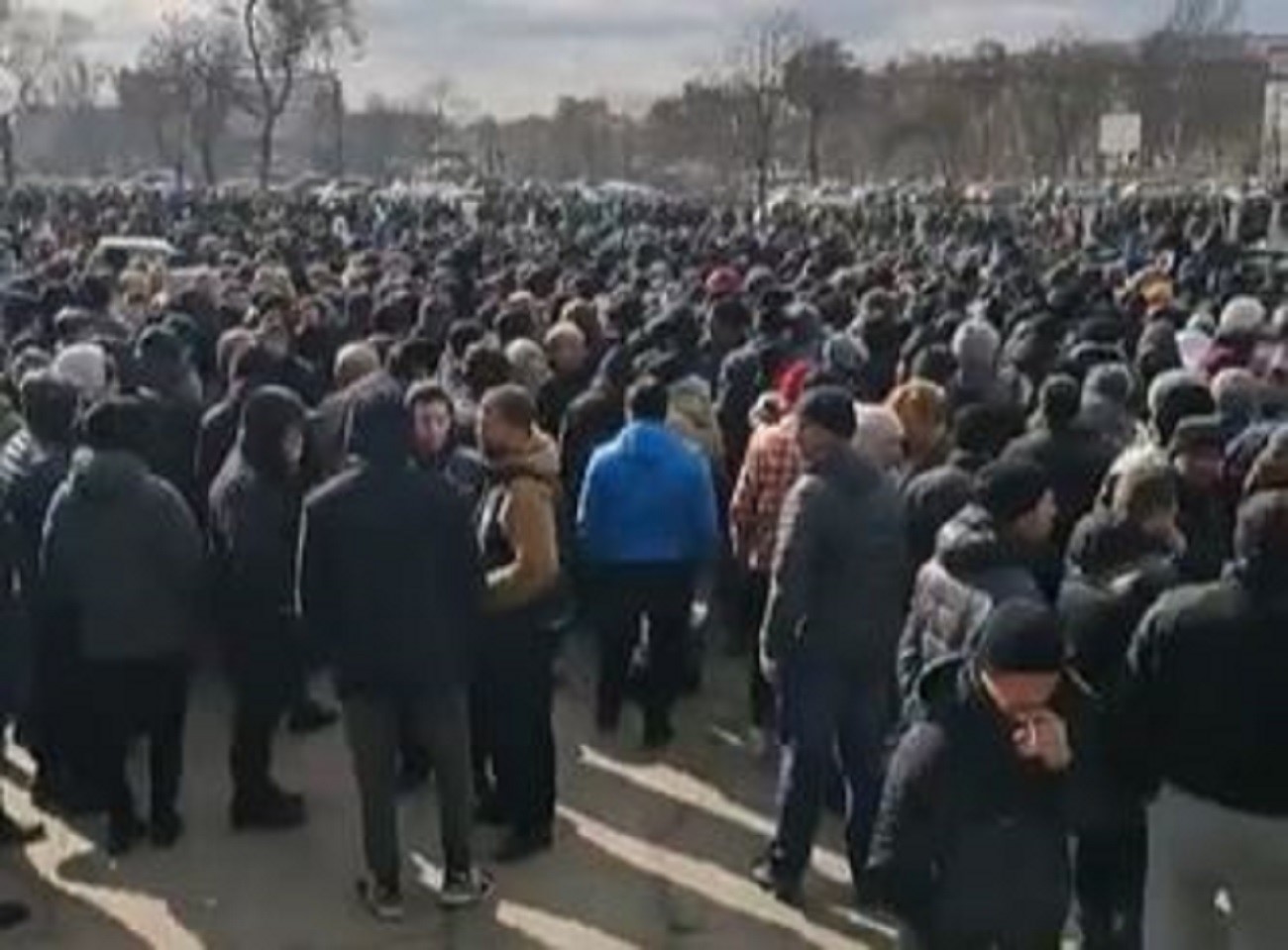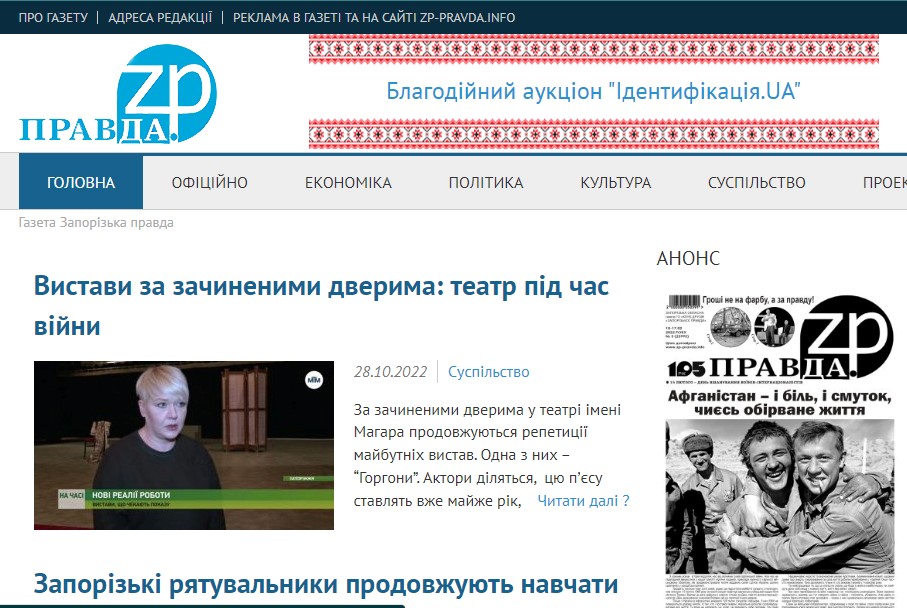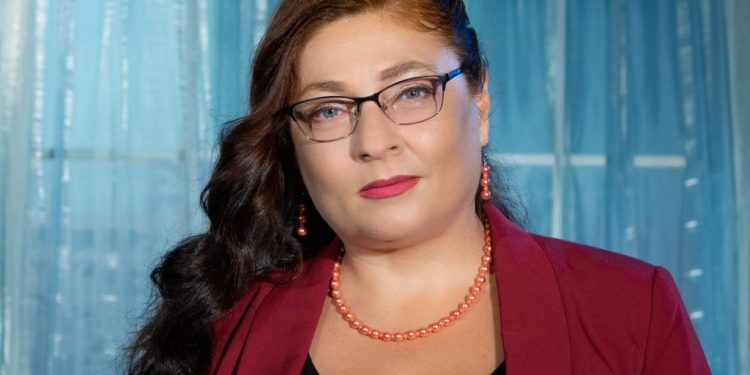The chief editor of the Zaporizka Pravda newspaper, Nataliya Zvoryhina, dedicated several years of her life to battling the regional authorities for the right of the oldest Ukrainian-language publication in Zaporizhia to exist. Despite the challenges, the media continued to thrive. However, on February 24, the fate of the editorial team, as well as the entire country, changed.
“I Knew Russia Couldn’t Be Trusted”
— February 24 was a shocking day for me. I knew Russia couldn’t be trusted, as I regularly went to the frontlines to deliver humanitarian aid and items the soldiers needed. I talked to them, and they were convinced the situation would escalate. I was prepared for everything but never thought that in February, Putin would initiate such a large-scale war. It was very deceitful,— says Nataliya.
On the first day of the full-scale war, the Zaporizka Pravda newspaper’s team released a new issue, but delivering it to subscribers became impossible due to the region’s occupation. Ukrposhta (Ukraine’s national postal service) attempted a trial delivery mission, sending a mobile postal unit at their own risk. Still, the outcome turned out to be far more tragic than expected.
— That mobile postal unit encountered a Russian tank that initially shot at it and then ran it over. In the car were the driver and a postal worker; they died. And the most terrible part was that their colleagues couldn’t retrieve their bodies for a long time because the occupiers wouldn’t allow anyone near. Those mutilated bodies lay there for about a week,— recalls Nataliya.
Following the tragic event, Nataliya coordinated with Ukrposhta to resume newspaper delivery only after the war’s conclusion, given the rapidly evolving situation. The occupiers continued to seize territory, reaching the Zaporizhia Nuclear Power Plant by March 4.
— They behaved with the nuclear power plant like a monkey with a grenade, not realizing the catastrophic nature of their actions. They stationed a bunch of equipment and weapons there. They took the employees hostage and kidnapped the plant’s director and then his deputy. I know they tried to sway the staff to cooperate, and there were even isolated cases where people switched sides. But the majority are true patriots; they didn’t agree to any of the invaders’ proposals,— the editor says.
Zaporizhians were not willing to tolerate the lawlessness of the invaders. On March 5, thousands of people gathered in the heart of the city, ready to resist. Men were asking for weapons. At that time, a powerful partisan movement emerged, locally referred to as the “farmer’s” movement.
“We Deliver Important Information to Our Audience”
Meanwhile, events were unfolding in the editorial office.

— Before the war, we created our website. We had an excellent internet radio station there, with many listeners and readers. But, unfortunately, the person responsible for the technical state of our website is under occupation; she stopped cooperating with us. This employee refused to provide us with passwords and logins; there was even blackmail involved… And to this day, our website is blocked; we don’t have access to it,— Ms. Zvoryhina sighs. — Therefore, we are not connected to whatever may be published on it.

Despite challenges, the Zaporizka Pravda team persisted. They focused on their newspaper’s Facebook page and two dedicated information groups: “True News of ZP” and the NGO “Friends of ‘Zaporizka Pravda’ Club.” Nataliya takes pride in maintaining a connection with loyal readers in occupied territories who eagerly await Ukraine’s resurgence.
— We convey crucial information to our audience about ongoing events, the state of affairs, offer valuable advice, and rally people around volunteer efforts. It’s wonderful that those in occupied territories can contact me to share vital information for publication,— emphasizes the journalist.
“We Have a Certain Mission, and We Must Accomplish It with Dignity”
In addition to her daily work, Nataliya doesn’t forget about personal development – so that she can work even more effectively in the information space after Ukraine’s victory.
— Since the newspaper stopped printing, I had the time and inspiration to complete sound engineering courses in Kyiv. Now I’m looking forward to joining a group of video operators to revive our video channel on our website. I already had some skills from working at ‘Suspilne’ (Ukraine’s public broadcaster) and hosting the program ‘Topic of the Day.’ I know the inside workings of this field, and now I need to enhance my technical knowledge. We are confident that Ukraine will triumph, that we will drive out the aggressors, and our newspaper will be reborn, our website will be restored, and we’ll have radio and television;— Nataliya shares her thoughts.
Nataliya also finds time for her hobbies: she creates traditional Ukrainian dolls called “motanky,” dances, and rides a bicycle.
— I realized that there won’t be a better time than now. So, at my respectable age, I finally learned to ride a bicycle— the journalist smiles. — And I also created a very powerful guardian angel using the ‘motanka’ doll technique. And I fulfilled a long-standing dream – I started dancing. I’m preparing to embrace victory fully armed.

Nataliya doesn’t lose faith in victory. The determined journalist is convinced that every Ukrainian should put in maximum effort from their side.
— Lastly, I want to give not just a wish but a directive. Watch yourselves. Everyone must do their job in their place and thereby bring victory closer. And watch over Ukraine so that in the fervor of the fight for independence, it doesn’t become dependent on anyone or anything. This is also very important, as it’s primarily about our future. We have a specific mission, and we must fulfill it with dignity,— emphasized Nataliya Zvorygina.
This series, titled Executed Free Speech, is created as part of a project Drawing Ukrainian And International Audience’s Attention To Serious Violations Of Human Rights And Crimes Against Journalists And Mass Media By The Russian Federation, which is performed by the National Union of Journalists of Ukraine, with support from the Swedish non-profit organization Civil Rights Defenders.
JOURNALISTS ARE IMPORTANT. Stories of Life and Work in Conditions of War is a cycle of materials prepared by the team of the NUJU with the support of the Swedish human rights organization Civil Rights Defenders.
#CRD

 THE NATIONAL UNION OF
JOURNALISTS OF UKRAINE
THE NATIONAL UNION OF
JOURNALISTS OF UKRAINE
















Discussion about this post